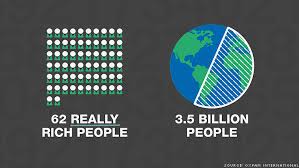The Richest 1% Now Own More Than 50% of the World’s Wealth

The richest 1% now owns more than half of all the world’s household wealth, according to analysts at Credit Suisse. And they say inequality is only going to get worse over the coming years, with millennials having a particularly tough time.
The Swiss bank released its latest Global Wealth Report on Tuesday, together with a statement that contained the immortal phrase, “The outlook for the millionaire segment is more optimistic than for the bottom of the wealth pyramid.”
The research showed that there are increasing numbers of dollar millionaires. This is partly because the strength of the euro has created 620,000 more of them in Germany, France, Italy and Spain (conversely, depreciating currencies in the U.K. and Japan have seen 34,000 and over 300,000 people in those countries respectively lose the status).
But almost half of the new dollar millionaires are in the U.S. itself. “So far, the Trump Presidency has seen businesses flourish and employment grow, though the ongoing supportive role played by the Federal Reserve has undoubtedly played a part here as well, and wealth inequality remains a prominent issue,” said Michael O’Sullivan, CIO for International Wealth Management at Credit Suisse.
Credit Suisse expects to see a 22% rise in dollar millionaires by 2022, from 36 million to 44 million. The problem is, the numbers of adults who have less than $ 10,000 are expected to shrink by only 4%.
The bank’s researchers see wealth inequality as largely being a result of the financial crisis— it rose across the world between 2007 and 2016, because financial assets were growing faster than non-financial assets. The top 1% started the millennium owning 45.5% of all wealth, and now they have 50.1%.
As for what’s been happening since mid-2016, Credit Suisse described a mixed picture. Non-financial wealth has been increasing “substantially,” but inequality is still rising.
“Despite higher mean wealth per adult, median wealth fell again this year in Africa, Asia-Pacific and Latin America. Our projections for 2022 suggest more pessimistic scenarios for the immediate years ahead,” the researchers said.
“Looking at the bottom of the wealth distribution, 3.5 billion people—corresponding to 70% of all adults in the world—own less than $ 10,000. Those with low wealth tend to be disproportionately found among the younger age groups, who have had little chance to accumulate assets, but we find that millennials face particularly challenging circumstances compared to other generations,” they wrote.
Essentially, millennials are more likely to be unemployed or earning less, priced out of the housing market, and unable to get a pension. Baby boomers have most of the wealth and the housing, so “millennials are doing less well than their parents at the same age.”
Millennials may be better educated than earlier generations, but Credit Suisse’s researchers said they expected only a “minority of high achievers and those in high-demand sectors such as technology or finance to effectively overcome the ‘millennial disadvantage.’”
